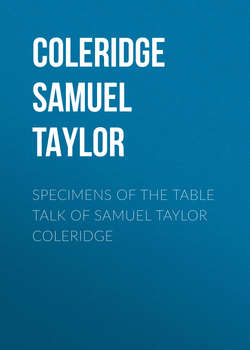Читать книгу Specimens of the Table Talk of Samuel Taylor Coleridge - Coleridge Samuel Taylor - Страница 6
TABLE TALK
January 4. 1828
ОглавлениеCHARACTER OF THE AGE FOR LOGIC.—PLATO AND XENOPHON.–GREEK DRAMA.– KOTZEBUE.—BURKE.—PLAGIARISTS
This is not a logical age. A friend lately gave me some political pamphlets of the times of Charles I. and the Cromwellate. In them the premisses are frequently wrong, but the deductions are almost always legitimate; whereas, in the writings of the present day, the premisses are commonly sound, but the conclusions false. I think a great deal of commendation is due to the University of Oxford for preserving the study of logic in the schools. It is a great mistake to suppose geometry any substitute for it.
* * * * *
Negatively, there may be more of the philosophy of Socrates in the Memorabilia of Xenophon than in Plato: that is, there is less of what does not belong to Socrates; but the general spirit of, and impression left by, Plato, are more Socratic.7
* * * * *
In Æschylus religion appears terrible, malignant, and persecuting: Sophocles is the mildest of the three tragedians, but the persecuting aspect is still maintained: Euripides is like a modern Frenchman, never so happy as when giving a slap at the gods altogether.
* * * * *
Kotzebue represents the petty kings of the islands in the Pacific Ocean exactly as so many Homeric chiefs. Riches command universal influence, and all the kings are supposed to be descended from the gods.
* * * * *
I confess I doubt the Homeric genuineness of [Greek: dakruoen gelaschsa].8 It sounds to me much more like a prettiness of Bion or Moschus.
* * * * *
The very greatest writers write best when calm, and exerting themselves upon subjects unconnected with party. Burke rarely shows all his powers, unless where he is in a passion. The French Revolution was alone a subject fit for him. We are not yet aware of all the consequences of that event. We are too near it.
* * * * *
Goldsmith did every thing happily.
* * * * *
You abuse snuff! Perhaps it is the final cause of the human nose.
* * * * *
A rogue is a roundabout fool; a fool in circumbendibus.
* * * * *
Omne ignotum pro magnifico. A dunghill at a distance sometimes smells like musk, and a dead dog like elder-flowers.
* * * * *
Plagiarists are always suspicious of being stolen from,—as pickpockets are observed commonly to walk with their hands in their breeches' pockets.
7
See p. 26. Mr. Coleridge meant in both these passages, that Xenophon had preserved the most of the man Socrates; that he was the best Boswell; and that Socrates, as a persona dialogi, was little more than a poetical phantom in Plato's hands. On the other hand, he says that Plato is more Socratic, that is, more of a philosopher in the Socratic mode of reasoning (Cicero calls the Platonic writings generally, Socratici libri); and Mr. C. also says, that in the metaphysical disquisitions Plato is Pythagorean, meaning, that he worked on the supposed ideal or transcendental principles of the extraordinary founder of the Italian school.
8
Greek: hos eipon, alochoio thilaes en chersin ethaeke paid eon hae d ara min chaeodei dexato cholpo, dachruoen gelasasa.]—Illiad. Z. vi. 482
